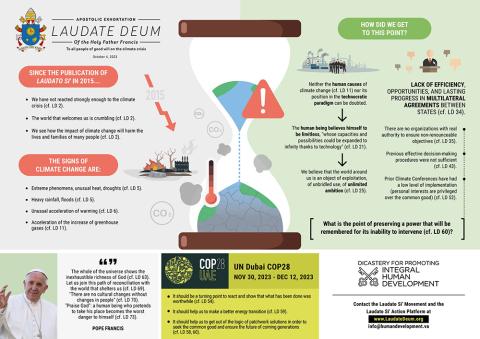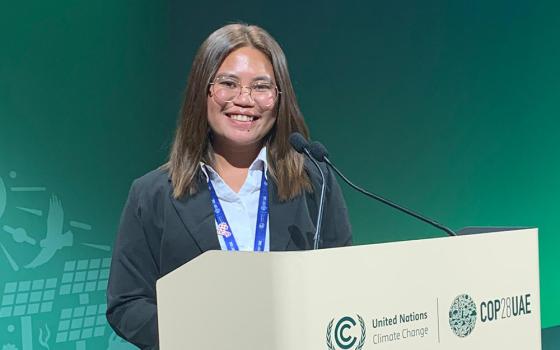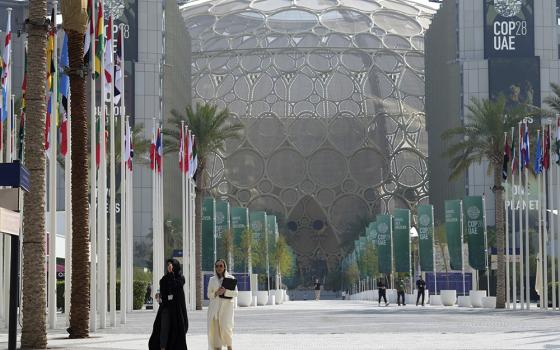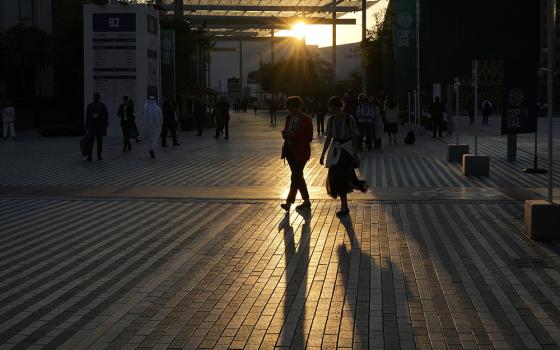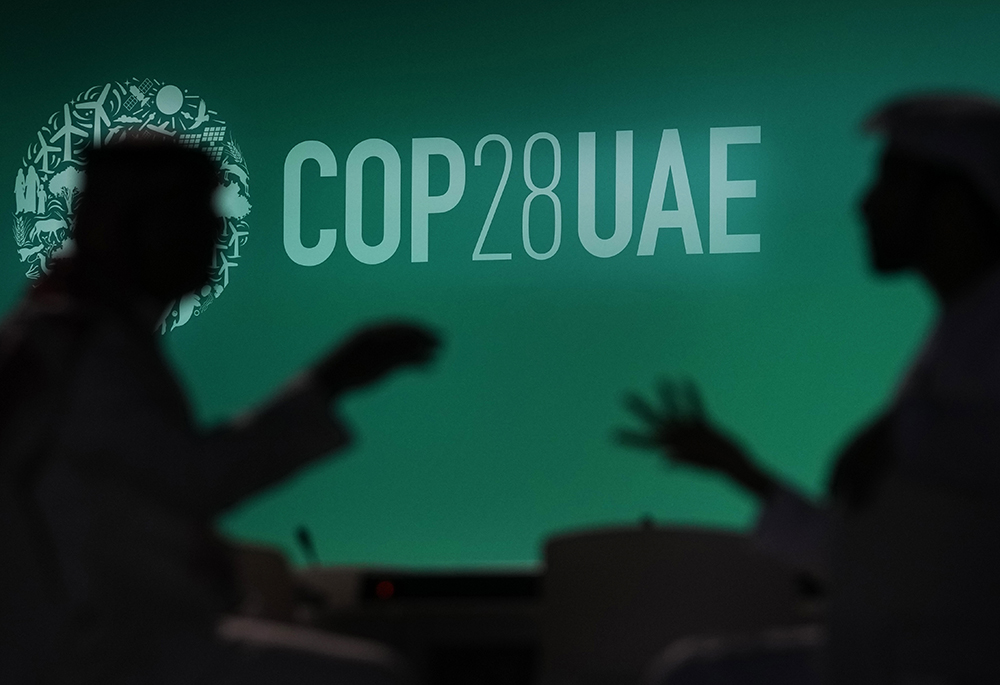
People are silhouetted against a logo for the COP28 U.N. climate summit, Nov. 29, in Dubai, United Arab Emirates. (AP photo/Rafiq Maqbool, File)
A United Nations climate summit facing the daunting task to put countries back on track to prevent catastrophic global warming will now have to do so without the presence of the pope.
COP28 opened Thursday (Nov. 30) in the United Arab Emirates, two days after the Vatican announced Pope Francis had canceled his plans to attend on advice of doctors as he recuperates from the flu.
Francis was set to become the first-ever pope to appear at a U.N. climate summit in its nearly 30-year history. The trip was widely seen as an effort by one of the world's predominant moral figures and an outspoken voice on ecological issues to help spark a course correction, as countries have fallen behind in efforts to limit human-caused climate change that endangers people and ecosystems.
Catholics heading to COP28, understanding of health precautions with the 86-year-old pope, vowed his message would still be heard throughout the plenary halls and corridors in Dubai at the climate summit.
"Our prayers are with him and wish him a speedy recovery," said Lorna Gold, executive director of FaithInvest and board president of the Laudato Si' Movement, a 900-member global network of Catholic organizations committed to acting on Francis' landmark encyclical "Laudato Si', on Care for Our Common Home."
"The mere fact he planned to go has upped the ante," Gold said. "It has raised the profile of the work faiths are doing. … It is down to all of us now to go with that same conviction to COP28 and bring his message."
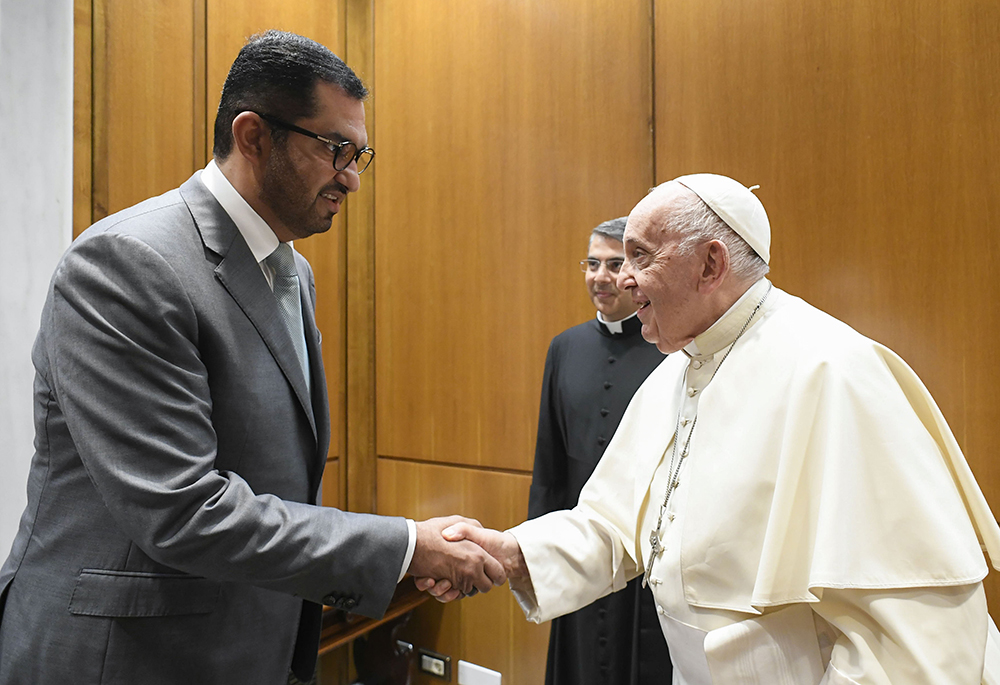
Pope Francis welcomes Sultan al-Jaber, the president-designate of the 2023 United Nations Climate Change Conference, known as COP28, to the Vatican Oct. 11. (CNS/Vatican Media)
Flu flummoxes papal plans
Arriving in Dubai to news of Francis' cancellation, Josianne Gauthier, secretary general of Catholic development network CIDSE, was both concerned for the pope and saddened he would not be bringing a "moral impulse" to Dubai's Expo City where the conference is taking place.
She told EarthBeat that fellow Catholics at COP28 had hoped Francis would not only inspire more urgent action on climate change and embolden the Holy See delegation but bring "a sense of collective responsibility and a will and belief that we can do more and better" that is often missing from international climate negotiations.
"If Pope Francis cannot be with us in the room physically, I hope he sends us a message — perhaps even in his own voice (a recorded video) — that shakes us up and wakes us up from our frozen paralysis and fear, and gives us the courage we need," Gauthier said in an email.
Cardinal Pietro Parolin, Vatican secretary of state, addresses COP27, Nov. 8, 2022, in Sharm el-Sheikh, Egypt. (CNS screenshot/UNFCCC)
In his three-day trip, Francis was scheduled to deliver a speech Dec. 2 on Day 2 of COP28's opening gathering of world leaders, where heads of state offer statements to the anticipated 70,000-plus participants. And the pope was set to help inaugurate on Dec. 3 alongside Grand Imam Ahmad el-Tayeb the first-ever Faith Pavilion at a climate conference.
In past years, Cardinal Pietro Parolin, Vatican secretary of state, has read a message on behalf of the pope during the high-level segment. As of Thursday, the Vatican had not indicated its new plans, including whether Francis may still participate virtually.
Though he'll be physically absent, Francis' leadership and moral authority will still be present in Dubai through this recent apostolic exhortation Laudate Deum, said Alistair Dutton, secretary general of Caritas Internationalis, the confederation of Catholic humanitarian and development organizations.
In the document, which was expected to form the basis of the pope's remarks, Francis outlined his expectations for COP28 while bluntly critiquing what he sees as a broken multilateralism process and limited progress countries have made in the eight years since the Paris Agreement was adopted.
Under that 2015 agreement, all nations committed to take steps to reduce greenhouse gas emissions — the primary driver of climate change, released by burning fossil fuels — in order to limit global warming ideally to 1.5 degrees Celsius and no more than 2 C. Every decimal of a degree of warming brings greater risks, and climate scientists have said surpassing 1.5 could expose millions more people to dangerous heat waves, droughts, floods and other extreme weather. Average global temperatures have risen 1.1 to 1.2 C since preindustrial times, and are on track to hit nearly 3 C by century's end.
"With the passage of time, I have realized that our responses have not been adequate," Francis wrote, later noting that "Despite the many negotiations and agreements, global emissions continue to increase."
"We must move beyond the mentality of appearing to be concerned but not having the courage needed to produce substantial changes," the pope said.
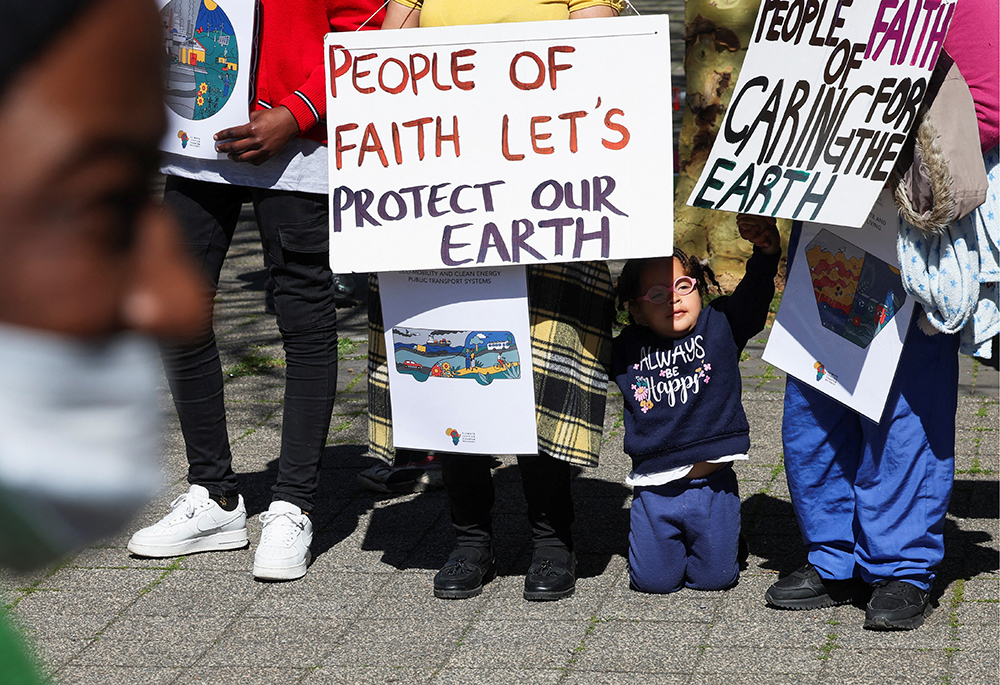
Climate activists in South Africa hold placards as they gather outside the Cape Town International Convention Center Sept. 13, during the Southern Africa Oil and Gas Conference to call for climate justice resistance against oil and gas corporations and an end to fossil fuels. (OSV News/Reuters/Esa Alexander)
Last year, the Holy See formally joined the Paris Agreement, and as part of the process submitted its own climate pledge, or nationally determined contribution, that committed the Vatican city-state to reduce emissions in the .44 square-kilometer territory by 20% compared to 2011 levels by 2030, and to reach net-zero emissions no later than 2050.
"Although the Vatican City State contributes to global emissions in an insignificant way, it considers it essential to invest in quality emission reduction projects as well as in integral ecology education initiatives," the Holy See stated in its NDC.
Nations behind on climate goals
A focal point at COP28 will be the conclusion of the "global stocktake" — a progress report expected to show countries well behind in accomplishing the Paris Agreement goals — that will fuel pressure for more ambitious actions in the next round of climate pledges set for 2025.
The pope's "frustration at global inaction for climate justice at anything like the scale that is needed is palpable," Dutton said in an email, "and his message is clear: we need strong commitments that will keep average global warming below 1.5 [degrees] C and these must be binding."
Lindlyn Moma, director of advocacy for Laudato Si' Movement, said Francis' absence "is sad news for the COP process, because we know the pope carried a very strong message."
"We believe and pray that the Vatican will proceed with the call of Laudate Deum and still bring a strong message to state parties to mitigate the climate crisis through binding commitments to phase out of fossil fuels," she told EarthBeat.
Following a summer of record-setting heat across the global map, a U.N. report issued in September confirmed that countries' climate policies to date are off track with the 1.5 C target and the window to keep it within reach "is rapidly closing."
A separate U.N. report in November found that global emissions are projected to increase 3% by 2030 based on policies currently in place, down from a 16% increase at the time of the Paris accord's adoption in 2015 but well off pace from the approximately 43% decrease by the end of this decade needed to keep the 1.5 C temperature rise limit a possibility.
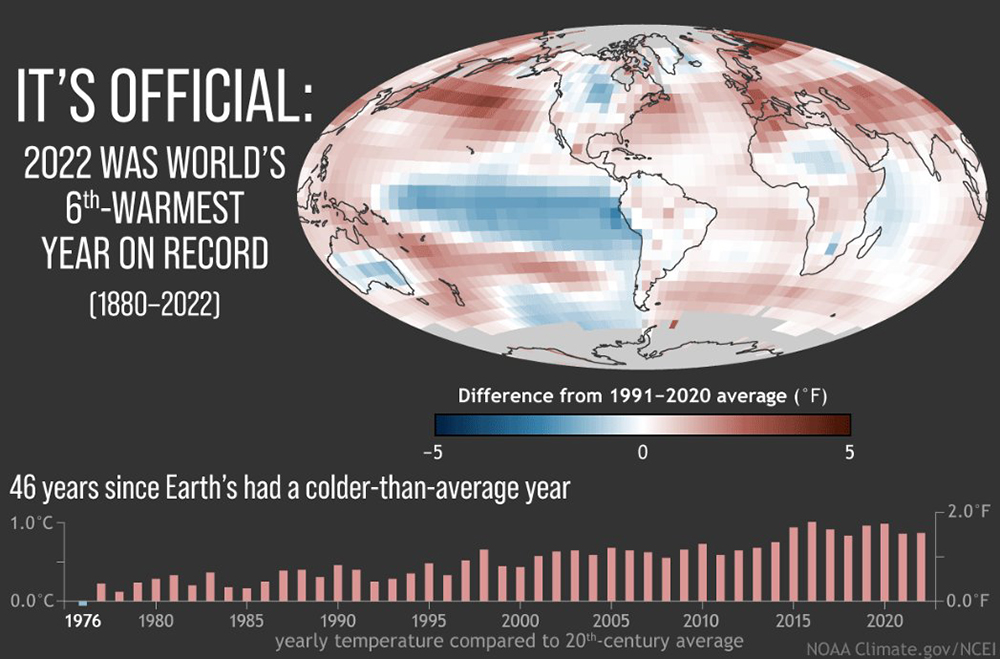
This graphic from Jan. 18, 2023, shows global average surface temperature in 2022 compared to the 1991-2020 average, with places that were warmer than average colored red and places that were cooler than average colored blue based on data from NOAA National Centers for Environmental Information. The bars on the graph show global temperatures compared to the 20th-century average each year from 2022 back to 1976 — the last year the world was cooler than average. (CNS/NOAA)
Still, signs of a clean energy transition have emerged.
Solar and wind energy made up 80% of new electricity generation in 2022, and the cost of renewable energy has plummeted in the past decade. Legislation in the U.S. and European Union, two of the leading historical emitters, have injected hundreds of billions of dollars into clean energy, and overall climate financing eclipsed $1 trillion in 2022, or 1% of global GDP, though still well short of what's required to limit warming to 1.5 C.
Ahead of the summit, the U.S. and China, together representing 38% of global greenhouse gas emissions, jointly announced each would work to triple renewable energy capacity by 2030, pursue "meaningful" emissions reductions this decade, including methane, and both recommitted to the 1.5 C target.
In the past, heads of state have used their addresses to announce new agreements and pledges. Momentum has built around commitments to triple renewable energy and double energy efficiency by 2030, while civil society groups and developing nations continue to push for a full phaseout of fossil fuels.
Advertisement
COP28 president Sultan al-Jaber has endorsed those 2030 goals but resisted a full fossil fuel phaseout. He and host country UAE, one of the world's largest oil producers, have faced persistent questions about the conflict of interests in leading the proceedings. A report this week (Nov. 27) from the BBC revealed the UAE sought to use lead-up meetings with other countries to strike oil and gas deals.
Numerous faith groups in Dubai will be renewing widespread calls for a "Fossil Fuel Non-proliferation Treaty" to halt all new fossil fuel projects and outline a path to fully abandon coal, oil and gas for renewable sources.
"We hope that countries at COP28 will live up to Pope Francis' urgent call for greater ambition on addressing the climate crisis, and for politicians to leave a legacy they can be proud of," said Neil Thorns, director of advocacy for CAFOD, the Catholic relief agency of England and Wales.
Loss and damage, financing priorities
Another major focus at COP28 will be the loss and damage fund that was established last year at COP27 in Egypt. Loss and damage refers to climate impacts that have already occurred or are unavoidable despite mitigation or adaptation efforts.
Ahead of the Dubai summit, Caritas Internationalis helped draft a faith leaders statement outlining five key principles in forming the fund. So far, more than 640 people from 58 countries have signed onto the statement, which will be delivered to world leaders at COP28.
The faith leaders have called for the fund to efficiently provide financing after extreme weather disasters and for it to be accessible to communities in the Global South. They say it should also provide grants instead of loans, adhere to human rights and equity principles, and support both economic and non-economic losses and damages.
Debate at COP28 on the loss and damage fund, which was long resisted by developed countries like the U.S., will center on who pays into it — for example, high-emitting countries and fossil fuel companies — and how much and where it's housed. A negotiating committee has recommended it be housed for a four-year interim period at the World Bank, which developing countries have strongly opposed.
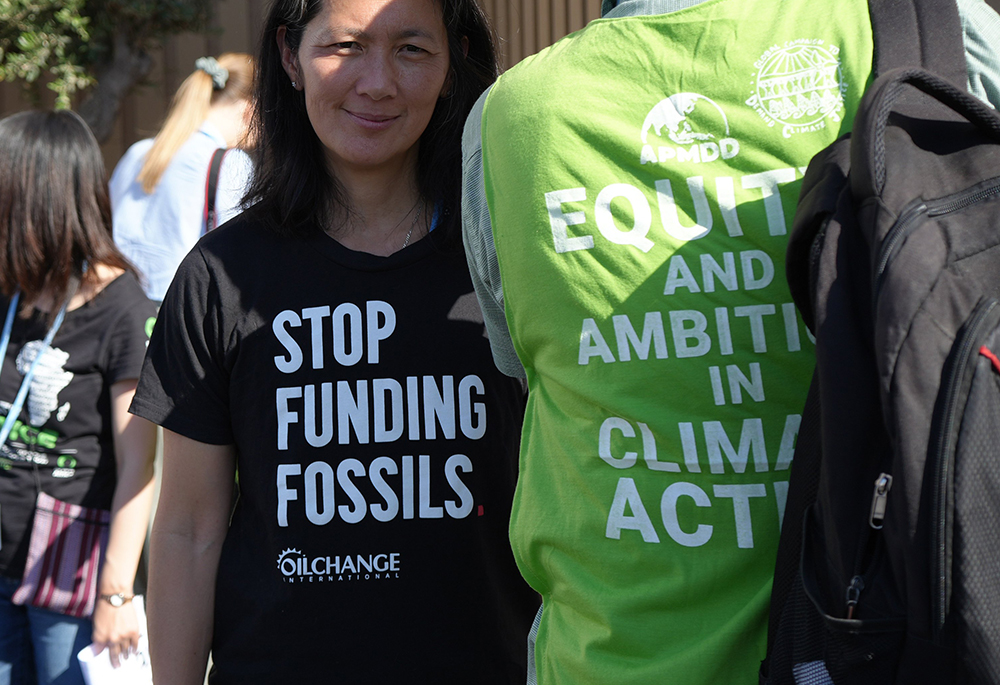
A protester wears a t-shirt with the message "Stop funding fossils" during a demonstration at the COP27 climate summit in Sharm el-Sheikh, Egypt, Nov. 9, 2022. Over 50 activists of all ages and backgrounds took over the so-called "Blue Zone" — the central area of the conference center in Sharm el-Sheikh — to chant, "Stop funding fossil fuels! Stop funding death!" (EarthBeat photo/Doreen Ajiambo)
"Increasingly from the communities that we all work with we know that loss and damage is real and present and hurting people already," Dutton said during a Nov. 23 webinar introducing the letter and a related report.
Other speakers highlighted examples of loss and damage across the world, especially in the Global South, such as severe drought in East Africa wiping out Kenyan farmers' animal herds and fossil fuel and mineral extraction destroying ecosystems and displacing communities.
Cardinal Soane Patita Paini Mafi of Tonga said the issue of loss and damage "brings to the heart of the United Nations the existential questions of what has value to us as a global community."
"For too long, our shared political and economic system has privileged only those things that can be quantified in monetary returns as having value, yet across the global community we know that much of what is important cannot ever be readily quantified. To assign them a monetary value is to strip them of what makes them precious and beautiful," he said.
Catholic development organizations will co-lead a discussion on faith-led actions on loss and damage Dec. 9 on the sidelines of the summit.
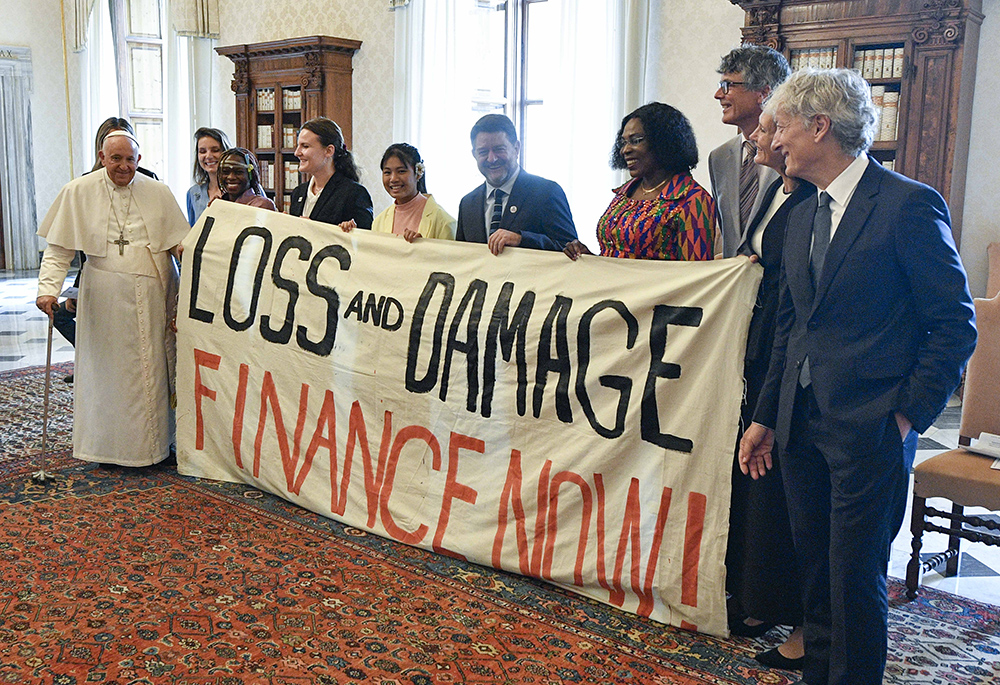
Pope Francis joins others in holding a banner during an audience at the Vatican June 5 with the organizers of the Green & Blue Festival. The banner calls for financing a "loss and damage" fund that was agreed upon at the COP27 U.N. climate conference in 2022. The fund would seek to provide financial assistance to nations most vulnerable and impacted by the effects of climate change. (CNS/Vatican Media)
Faith representatives have outlined other priorities for COP28.
Along with financing for loss and damage, they've joined calls for fulfillment of the long-pledged $100 billion annually from industrialized countries for mitigation and adaptation in developing nations, and consideration of debt swap deals.
They will also advocate for aligning responses to climate change with the global biodiversity framework nations reached in December 2022 that called for halting and reversing nature loss by 2030. Other priorities include establishing sustainable agriculture practices, ensuring transparency and a robust grievance process for carbon markets, and supporting Indigenous communities.
"In line with the teachings of Pope Francis and the core tenets of the Catholic faith, we also expect [world leaders] to uphold principles of climate justice, ensuring that the poorest and most vulnerable communities, who are often the most affected by climate change, are not left behind," Jose Aguto, executive director of the U.S.-based Catholic Climate Covenant, said in a statement.
Faith Pavilion a first
Beyond the geopolitical negotiations, COP28 serves as a major conference, with hundreds of panels and presentations held throughout its two weeks.
A total of 65 events will take place at the Faith Pavilion during the summit's two weeks. A new website provides a full schedule and sessions will be livestreamed.
Events will highlight the role of faith in climate adaptation and nature restoration efforts, leveraging faith organizations' investments for effective climate responses, and how the concept of integral ecology outlined in Laudato Si' can overcome technocratic-only approaches to climate solutions.
More than a meeting space, the Faith Pavilion, hosted by the Muslim Council of Elders and developed with the U.N. Environment Programme's Faith for Earth coalition, is meant to serve as a platform to amplify the role of religion and moral principles in the tense, often technically focused climate negotiations.
Even if that now means without the pope.
Iyad Abumoghli, founder and director of Faith for Earth, said though Francis won't be in Dubai in person, "his remarkable leadership will be felt, inspiring us to drive forward in his absence."
"We will seek to continue his work at COP28," Thorns said.

